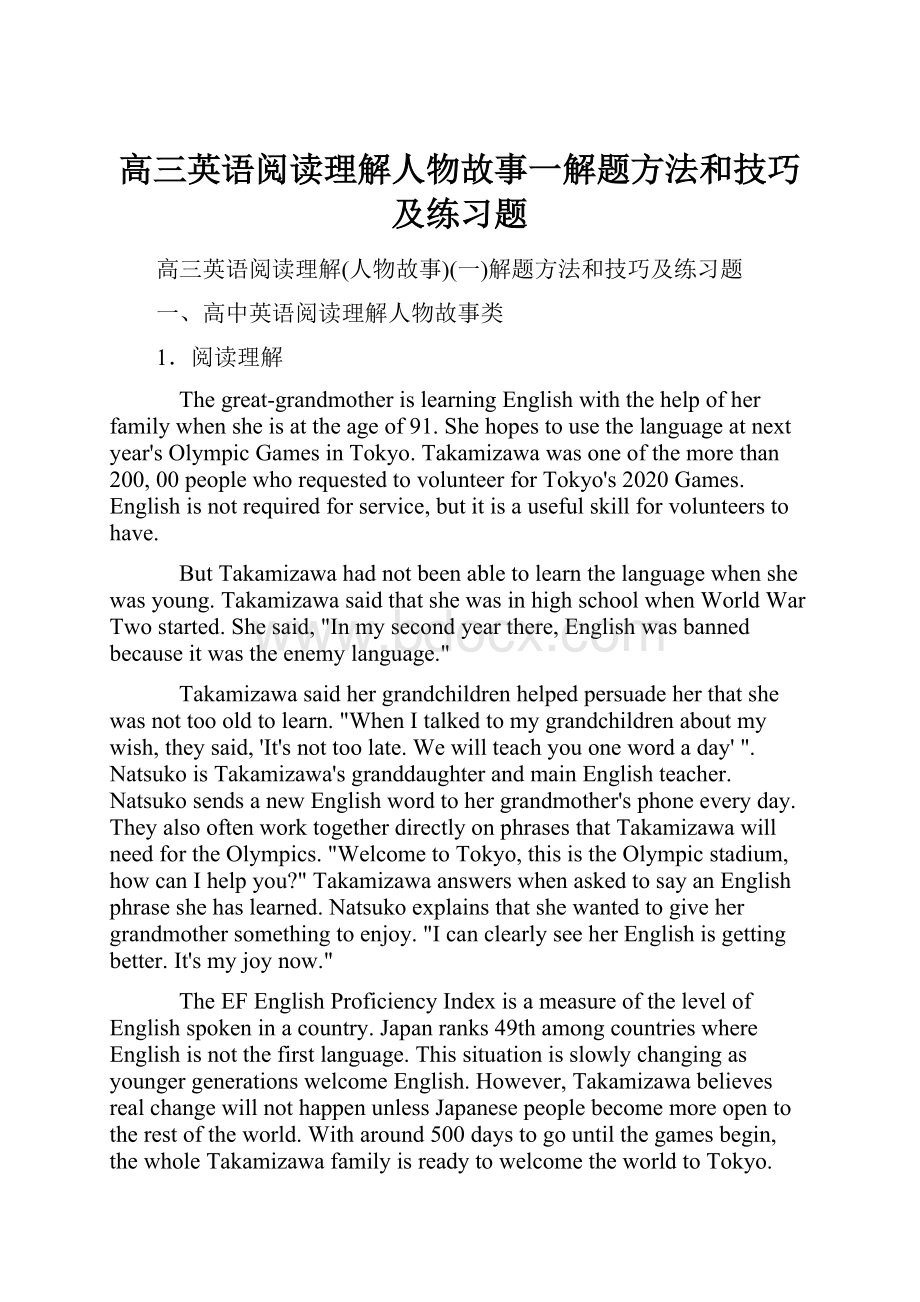高三英语阅读理解人物故事一解题方法和技巧及练习题.docx
《高三英语阅读理解人物故事一解题方法和技巧及练习题.docx》由会员分享,可在线阅读,更多相关《高三英语阅读理解人物故事一解题方法和技巧及练习题.docx(29页珍藏版)》请在冰豆网上搜索。

高三英语阅读理解人物故事一解题方法和技巧及练习题
高三英语阅读理解(人物故事)
(一)解题方法和技巧及练习题
一、高中英语阅读理解人物故事类
1.阅读理解
Thegreat-grandmotherislearningEnglishwiththehelpofherfamilywhensheisattheageof91.Shehopestousethelanguageatnextyear'sOlympicGamesinTokyo.Takamizawawasoneofthemorethan200,00peoplewhorequestedtovolunteerforTokyo's2020Games.Englishisnotrequiredforservice,butitisausefulskillforvolunteerstohave.
ButTakamizawahadnotbeenabletolearnthelanguagewhenshewasyoung.TakamizawasaidthatshewasinhighschoolwhenWorldWarTwostarted.Shesaid,"Inmysecondyearthere,Englishwasbannedbecauseitwastheenemylanguage."
Takamizawasaidhergrandchildrenhelpedpersuadeherthatshewasnottoooldtolearn."WhenItalkedtomygrandchildrenaboutmywish,theysaid,'It'snottoolate.Wewillteachyouonewordaday'".NatsukoisTakamizawa'sgranddaughterandmainEnglishteacher.NatsukosendsanewEnglishwordtohergrandmother'sphoneeveryday.TheyalsooftenworktogetherdirectlyonphrasesthatTakamizawawillneedfortheOlympics."WelcometoTokyo,thisistheOlympicstadium,howcanIhelpyou?
"TakamizawaanswerswhenaskedtosayanEnglishphraseshehaslearned.Natsukoexplainsthatshewantedtogivehergrandmothersomethingtoenjoy."IcanclearlyseeherEnglishisgettingbetter.It'smyjoynow."
TheEFEnglishProficiencyIndexisameasureofthelevelofEnglishspokeninacountry.Japanranks49thamongcountrieswhereEnglishisnotthefirstlanguage.ThissituationisslowlychangingasyoungergenerationswelcomeEnglish.However,TakamizawabelievesrealchangewillnothappenunlessJapanesepeoplebecomemoreopentotherestoftheworld.Witharound500daystogountilthegamesbegin,thewholeTakamizawafamilyisreadytowelcometheworldtoTokyo.
(1)Whycouldn'tTakamizawalearnEnglishwhenshewasyoung?
A. BecauseEnglishwasuseless.
B. BecauseshewastooyoungtolearnEnglish.
C. BecauseEnglishwasforbiddentolearn.
D. BecauseshewasunwillingtolearnEnglish.
(2)Whatcanweknowfromthethirdparagraph?
A. Takamizawagetsstrongsupportfromherfamily.
B. Takamizawa'sgrandchildrenloveheralot.
C. NatsukoisTakamizawa'sgranddaughterandonlyEnglishteacher.
D. NatsukoteachesTakamizawaEnglishmainlybytalkingwithher.
(3)Whatdoestheunderlinedphrase"Thissituation"inParagraph4referto?
A. EnglishisnotthefirstlanguageinJapan.
B. ThelevelofEnglishspokeninJapanisrelativelylow.
C. YoungergenerationsinJapanwelcomeEnglish.
D. Japanesepeoplebecomeopentotherestoftheworld.
(4)Whatisthemainideaofthepassage?
A. Wherethereisawill,thereisaway.
B. Itisnevertoolatetolearn.
C. Theearlybirdcatchestheworm.
D. Twoheadsarebetterthanone.
【答案】
(1)C
(2)A
(3)B
(4)B
【解析】【分析】本文是一篇记叙文,日本91岁的奶奶Takamizawa为了做好迎接在东京举行的2020奥运会的志愿工作,在孙辈的鼓励和帮助下开始学习英语。
(1)考查细节理解。
根据第二段中的“ButTakamizawahadnotbeenabletolearnthelanguagewhenshewasyoung.TakamizawasaidthatshewasinhighschoolwhenWorldWarTwostarted.Shesaid,‘Inmysecondyearthere,Englishwasbannedbecauseitwastheenemylanguage.’”可知,是在她高中二年级时第二次世界大战大战爆发了,而英语因为是敌人的语言被禁止了,故选C。
(2)考查细节理解。
根据第三段中的”Takamizawasaidhergrandchildrenhelpedpersuadeherthatshewasnottoooldtolearn.‘WhenItalkedtomygrandchildrenaboutmywish,theysaid,‘It'snottoolate.Wewillteachyouonewordaday'”.可知她的孙辈说服并且帮助她学习英语,因此推断她从家人那里得到很大的支持。
故选A。
(3)考查词义猜测。
根据第四段中的“Japanranks49thamongcountrieswhereEnglishisnotthefirstlanguage.”在英语不是第一语言的国家中,日本排名第49位。
可知“Thissituation”指的是在日本人的英语水平相对较低,故选B。
(4)考查主旨大意。
文章主要介绍了日本91岁的奶奶Takamizawa在孙辈的鼓励和帮助下学习英语,从她身上体现了“活到老,学到老”的精神,故选B。
【点评】本题考点涉及细节理解,词义猜测和主旨大意三个题型的考查,是一篇故事类阅读,要求考生在捕捉细节信息的基础上,进一步根据上下文的逻辑关系,进行分析,推理,概括和归纳,从而选出正确答案。
2.阅读理解
Sometimesjustwhenweneedthepowerofmiraclestochangeourbeliefs,theymaterializeintheplaceswe'dleastexpect.Theycancometousasagreatchangeinourphysicalrealityorasasimplecoincidenceinourlives.Sometimesthey'rebigandcan'tbemissed.Othertimesthey'resosubtlethatifwearen'taware,wemaymissthemaltogether.Theycancomefromthelipsofastrangerwesuddenlyandmysteriouslymeetatjusttherightinstant.Ifwelistencarefully,we'llalwaysheartherightwords,attherighttime,todazzle(目眩)usintoarealizationofsomethingthatwemayhavefailedtonoticeonlymomentsbefore.
OnacoldJanuaryafternoonin1989,IwashikingupthetrailthatleadstothetopofEgypt'sMt.Horeb.I'dspentthedayatSt.Catherine'sMonasteryandwantedtogettothepeakbysunsettoseethevalleybelow.AsIwaswindingupthenarrowpath,I'doccasionallyseeotherhikerswhowerecomingdownfromadayonthemountain.Whiletheywouldgenerallypasswithsimplyanodoragreetinginanotherlanguage,therewasonemanthatdaywhodidneither.
Isawhimcomingfromthelastswitchbackonthetrailthatledtothebacksideofthemountain.Ashegotcloser,IcouldseethathewasdresseddifferentlyfromtheotherhikersI'dseen.Ratherthanthehigh-techfabricsandstylesthathadbeenthenorm,thismanwaswearingtraditionalEgyptianclothing.Heworeatattered,rust-coloredgalabiaandobviouslyoldandthick-soledsandalsthatwerecoveredindust.Whatmadehisappearancesoodd,though,wasthatthemandidn'tevenappeartobeEgyptian!
Hewasasmall-framedAsianman,hadverylittlehair,andwaswearinground,wire-rimmedglasses.
Aswenearedoneanother,Iwasthefirsttospeak,"Hello,"Isaid,stoppingonthetrailforamomenttocatchmybreath.Notasoundcamefromthemanashewalkedcloser.Ithoughtthatmaybehehadn'theardmeorthewindhadcarriedmyvoiceawayfromhiminanotherdirection.Suddenlyhestoppeddirectlyinfrontofmeonthehighsideofthetrail,lookedupfromtheground,andspokeasinglesentencetomeinEnglish,"Sometimesyoudon'tknowwhatyouhavelostuntilyou'velostit."AsItookinwhatIhadjustheard,hesimplysteppedaroundmeandcontinuedhisgoingdownthetrail.
Thatmomentinmylifewasasmallmiracle.Thereasonislessaboutwhatthemansaidandmoreaboutthetimingandthecontext.Theyearwas1989,andtheColdWarwasdrawingtoaclose.whatthemanonthetrailcouldn'thaveknownisthatitwasduringmyEgyptianpilgrimage(朝圣),andspecificallyduringmyhiketothetopofMoses'smountain,thatI'dsetthetimeasidetomakedecisionsthatwouldaffectmycareerinthedefenseindustry,myfriends,myfamily,and,ultimately,mylife.
IhadtoaskmyselfwhatthechanceswereofanAsianmandressedinanEgyptiangalabiacomingdownfromthetopofthishistoricmountainjustwhenIwaswalkingup,stoppingbeforeme,andofferinghiswisdom,seeminglyfromoutofnowhere.Myanswertomyownquestionwaseasy:
theoddswereslimtonone!
Inameetthatlastedlessthantwominutesonamountainhalfwayaroundtheworldfrommyhome,atotalstrangerhadbroughtclarityandthehintofawarning,regardingthehugechangesthatIwouldmakewithinamatterofdays.Inmywayofthinking,that'samiracle.
Isuspectthatweallexperiencesmallmiraclesinourliveseveryday.SometimeswehavethewisdomandthecouragetorecognizethemforwhattheyareInthemomentswhenwedon't,that'sokayaswell.Itseemsthatourmiracleshaveawayofcomingbacktousagainandagain.Andeachtimetheydo,theybecomealittlelesssubtle,untilwecan'tpossiblymissthemessagethattheybringtoourlives!
Thekeyisthatthey'reeverywhereandoccureverydayfordifferentreasons,inresponsetothedifferentneedsthatwemayhaveinthemoment.Ourjobmaybelessaboutquestioningtheextraordinarythingsthathappeninourdailylivesandmoreaboutacceptingthegiftstheybring.
(1)WhydidtheauthormakeapilgrimagetoMtHorebinEgypt?
A. Hewasinsearchofamiracleinhislife.
B. Itwasaholyplaceforareligiouspersontoheadfor.
C. Heintendedtomakearrangementsforhislifeinthefuture.
D. Hewaitedpatientlyinexpectationofmeetingawiseperson.
(2)Whatdoestheunderlinedpart"myownquestion"refertoinparagraph6?
A. Forwhatreasondidthemanstopbeforeme?
B. WhydidtheAsianmangotothemountain?
C. WhatchangewouldImakewithinamatterofdays?
D. Whatwastheprobabilitythatotherstoldustherightwords?
(3)Whichofthefollowingisclosestinmeaningtotheunderlinedword"subtle"inparagraph7?
A. Apparent.
B. Delicate.
C. Precise.
D. Sufficient.
(4)TheauthorviewedthemeetwiththeAsianmanasamiracleinhislifeinthat________.
A. theAsianman'sappearancehadadecidingeffectonhisfuturelife
B. hiswordswereinperfectresponsetotheneedhehadatthatmoment
C. whattheAsianmansaidwasabundantinthephilosophyoflife
D. theAsianmanimpressedonhimtheworthofwhathehadpossessed
(5)Whatmightbethebesttitleforthepassage?
A. Canyourecognizeamiracle?
B. Isamiraclesignificanttous?
C. Whenmightamiracleoccur?
D. Whydoweneedamiracle?
(6)AftertheencounteroftheAsianman,whatwillthewriterprobablydoimmediately?
A. Continuewalkinguptothetopofthemountain.
B. Havearesttorefreshhimself.
C. Trytohaveaheart-to-heartconversationwiththeAsianman.
D. Comedownthemountain.
【答案】
(1)C
(2)D
(3)B
(4)B
(5)A
(6)D
【解析】【分析】本文是一篇记叙文,作者讲述了一次埃及朝圣时,爬到何烈山半山腰时,偶遇了一位正在下山的亚洲陌生人。
这位智者停下来给作者说“在失去前你不知道你得到了什么”。
点醒了作者做出正确的决定。
并讲述了作者通过这件事情对奇迹的思考,我们生活时时处处